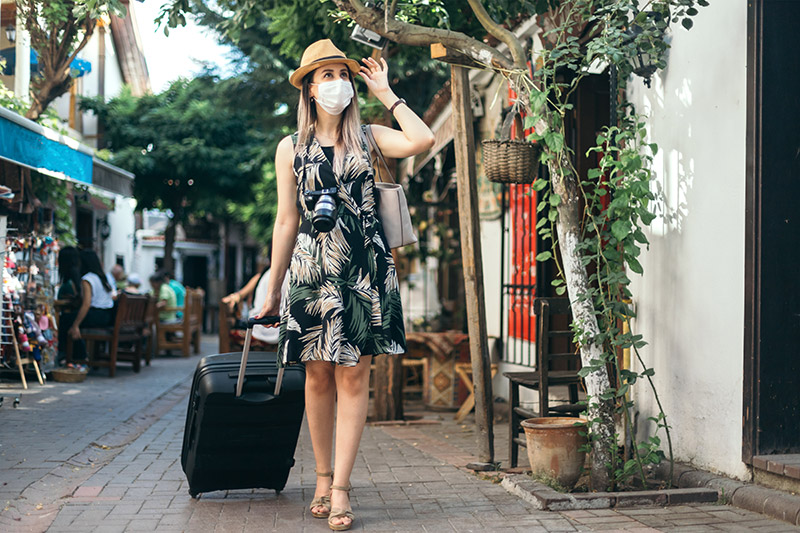Safe and sustainable tourism in times of COVID-19
Changes from pandemic may help hotels, restaurants, travel industries emerge stronger
Story by Phillip Fiorini
"Where travel is starting to rebound is where consumers are recognizing the value in that experience and a willingness to spend more to be and feel safe." — Jonathon Day, associate professor of hospitality and tourism management
The hotel, restaurant and travel industries have been among the hardest hit during the COVID-19 global pandemic. But consumers’ love for travel and exotic experiences may help many businesses driving these sectors weather the downturn and emerge structurally stronger post-COVID-19.
Jonathon Day, an associate professor of hospitality and tourism management at Purdue and a sustainable tourism expert, is optimistic many of the businesses in these industries will be potentially revitalized by their resilience on the other side of the pandemic — when that day arrives.
 Jonathon Day, associate professor of hospitality and tourism management
Jonathon Day, associate professor of hospitality and tourism management
“Historically, the tourism, restaurant and hotel industries have led our economic recoveries. Going forward, that’s going to be much more challenging because of COVID-19,” Day says. “The good news is that people are keen on returning to travel, to support their local restaurants, to experience the things they’ve not been able to experience during the pandemic. There’s a real desire to get out.”
That pent-up consumer desire, Day says, will be the wind behind the sails in support of the industry’s recovery. Yet he acknowledges that consumers remain cautious in an environment that’s likely to extend this downturn well into 2021 and even 2022.
“It will be a bumpy-ride recovery, with these localized waves of reopening and pulling back, until we have a vaccine for the coronavirus,” he says.
The World Travel and Tourism Council, a trade group representing major global travel companies, projects a global loss of 75 million jobs and $2.1 trillion in revenue due to COVID-19. Domestically, the U.S. Travel Association estimates $505 billion in industry losses through the end of 2020 for a total of $81 billion in lost federal, state and local taxes during that period — U.S. air travel during the first few months of the pandemic, for example, was down as much as 95%. The U.S. travel industry may not fully recover until 2024, the industry group predicts.
The federal government’s three recovery initiatives to date are expected to generate $71 billion for the travel industry by the end of 2021, delivering $163 billion in economic output and restoring nearly 800,000 jobs. This for an industry that, in normal times, generates $2.6 trillion for the U.S. economy every year while supporting 15.8 million U.S. jobs, or one in 10 working Americans.
Ironically, U.S. travel spending topped $1.1 trillion in 2019, an all-time high, and was the No. 2 U.S. export before the pandemic.
Still, Day is convinced the industry can take some good from the challenges of the global coronavirus pandemic. Specifically, he points to those in the tourism industry who have embraced the value of safety and cleanliness and accelerated the transformation into more digital operations and online engagement with their customers.
“Consumers need to feel it’s safe to have fun,” says Day, who has created the website, travelcarecode.org, to promote responsible travel. “Where travel is starting to rebound is where consumers are recognizing the value in that experience and a willingness to spend more to be and feel safe.”
Day has been encouraged by the many initiatives across the country that are encouraging consumers to support local restaurants, hotels and other businesses that rely on out-of-towners and tourism — “We’re seeing consumers spending money where it will help their local communities,” he says.
Day also sees positives with more industry members diversifying their revenue streams, broadening their reliance on local and regional travelers, and implementing more aggressive crisis-planning and resilience measures.
“This is an ideal time to focus on regenerative tourism strategies – approaches designed to improve the quality of life in destination communities – today and in years to come,” Day says.
“Everyone wants to come back to the way it was. As we rebuild this industry, we need to take a moment and think that through — to discover opportunities to experience things we have not experienced in the past,” Day adds. “The primary goal is to make the travel experience better for the consumer, for the hospitality and tourism industry, and for the communities that host visitors.”
Tips for Traveling Responsibly
- Spend locally
- Be a good guest
- Protect your environment
For more information, go here.
More Life 360 Stories
Milestones
Alumni
- Model Behavior
- On the Frontline of COVID-19
- Alumni making giant leaps in health care, aviation industries
- Tradition Transformed
- Emerging Leaders
Research
- Wearable and affordable, device targets swallowing disorders
- Evolution of a Research Relationship: From PhD Student to Peer
- Rapid Response Grant Recipients
Faculty
- Wearable and affordable, device targets swallowing disorders
- Beware the ‘quarantini’
- Safe and sustainable tourism in times of COVID-19
- Building a Community of Support
- Adapting Online … in a Hurry
- Thinking Beyond the Pandemic
- Rapid Response Grant Recipients
- Risk & Resilience: How the Pandemic Affects Those with Special Needs
Students
- Evolution of a Research Relationship: From PhD Student to Peer
- On the Frontline of COVID-19
- Tradition Transformed
- Adapting Online … in a Hurry
- Pandemic Pivot brings Gen Zs and Baby Boomers together in unique way
- HTM students learn and build community
- Emerging Leaders

